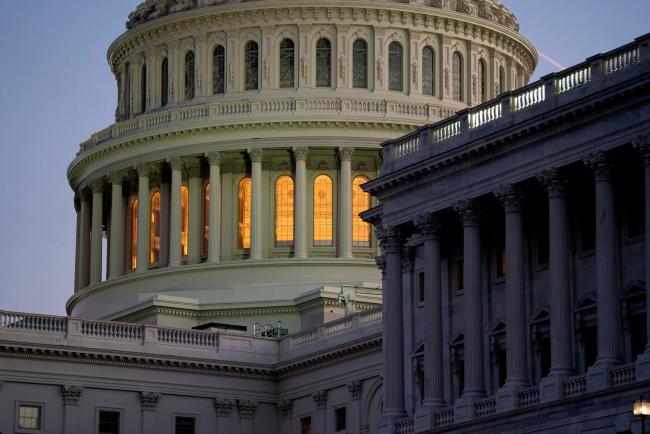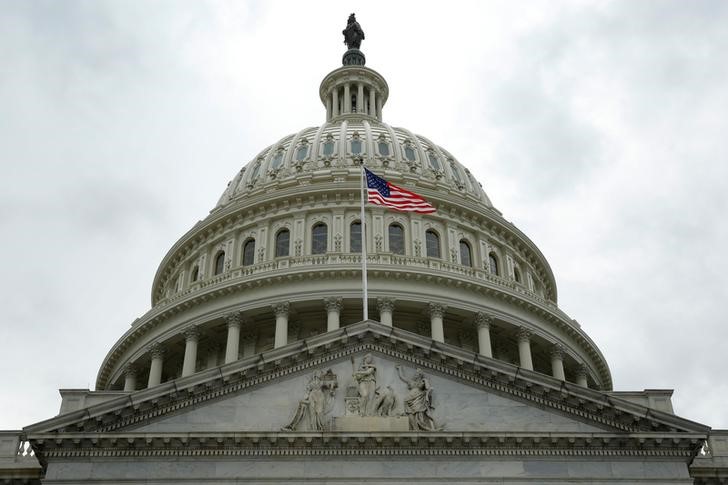(Bloomberg) -- The U.S. Senate advanced legislation creating a fast-track path to raise the federal debt ceiling, moving another step closer to closing off the risk of a government default.
The 64-36 vote enables the full Senate to take up legislation giving the Democratic majority one-time authority to raise the country’s borrowing authority without threat of a GOP filibuster. It marks an about-face for Senate Republicans, who had vowed not to cooperate with Democrats on increasing the debt limit.
“It was the right thing to do because the last in the world this country needs is a default,” Alaska Republican Lisa Murkowski, who voted to advance the bill. “And so we’ve set up a process to avoid default. It’s not ideal, but it allows us to avoid the catastrophe that would come if we default.”
The legislation is expected to pass later Thursday or early Friday. It will be followed by action on a separate measure to raise the debt limit by a level that hasn’t been announced but is likely to cover borrowing through 2022. Timing for a vote on that bill, which can be passed by a simple majority, hasn’t been set.
The House, on a 222-212 vote Tuesday, cleared the same legislation, which also cancels automatic cuts to Medicare, farm subsidies and other programs triggered by deficit spending earlier this year. Final Senate action would send the measure to President Joe Biden for his expected signature.
Treasury Secretary Janet Yellen has warned that the government could hit the debt limit and have difficulty meeting its obligations after Dec. 15, though outside analysts have said the government has a bit more time.
Congress added $480 billion to the U.S. debt ceiling in October after weeks of partisan sniping that rattled financial markets. Republicans demanded that Democrats use their slim majorities in both chambers to approve a debt ceiling increase on their own using a budget process Democrats said was too cumbersome and designed to impede their work on Biden’s nearly $2 trillion economic package.
Senate Minority Leader Mitch McConnell ultimately pivoted and proposed the short-term increase approved in October. Eleven Republicans joined Democrats to pave the way for a floor. At the time, McConnell vowed it would be the last time Republicans would come to the aid of Democrats on the debt ceiling.
Negotiations
But McConnell began discussions with Majority Leader Chuck Schumer in November to move the next increase. On Tuesday the two said they had agreed on the one-time procedural maneuver that likely will result in a higher debt ceiling by this weekend or early next week. Schumer declared that “Democrats would carry the burden” of voting for it.
“I think this is in the best interests of the country,” McConnell said of their accord, adding that it also was in “in the best interests of Republicans.”
The compromise still allows all Republicans to cast a “no” on raising the debt ceiling while default is averted. It comes a week after McConnell and Schumer agreed on a stop-gap spending bill that extends current agency spending levels until Feb. 18, averting a government shutdown.
All but one Republican in the House voted against the compromise and some GOP senators were critical of the approach. Senator Chuck Grassley of Iowa, the longest-serving current GOP senator, said “it’s a gimmick to get around the filibuster” that could lead to other attempts to bypass the minority party on debt limit increases.
“I think it’s a bad precedent,” Grassley said on Bloomberg Television’s “Balance of Power” program.
McConnell’s allies say the GOP leader is looking toward next year’s midterm elections and is more interested in keeping the focus on Biden’s lower approval ratings and the soaring inflation that is crimping household budgets throughout the nation.
“Democrats aren’t going to escape that, regardless of the process stuff here,” GOP Senator Mike Braun of Indiana said. “Most people at home aren’t going to understand this anyway. They’re going to understand gas being at close to four bucks a gallon and food prices at record highs.”
The debt-ceiling bill under consideration in the Senate would tie the temporary process with other language that would stave off nearly 10% in mandatory cuts to Medicare payments under the so-called Paygo law set to go into effect on Jan. 1. The looming cuts have alarmed hospital and doctors groups that say Medicare fee-for-service payments could be reduced by $14.1 billion in 2022 unless there’s action to stop them. These cuts would also affect trade adjustment assistance, which helps workers who have lost their jobs due to trade-related circumstances, and farm price supports. Congress has previously waived the Paygo rule, which is designed to contain the federal deficit.
©2021 Bloomberg L.P.

